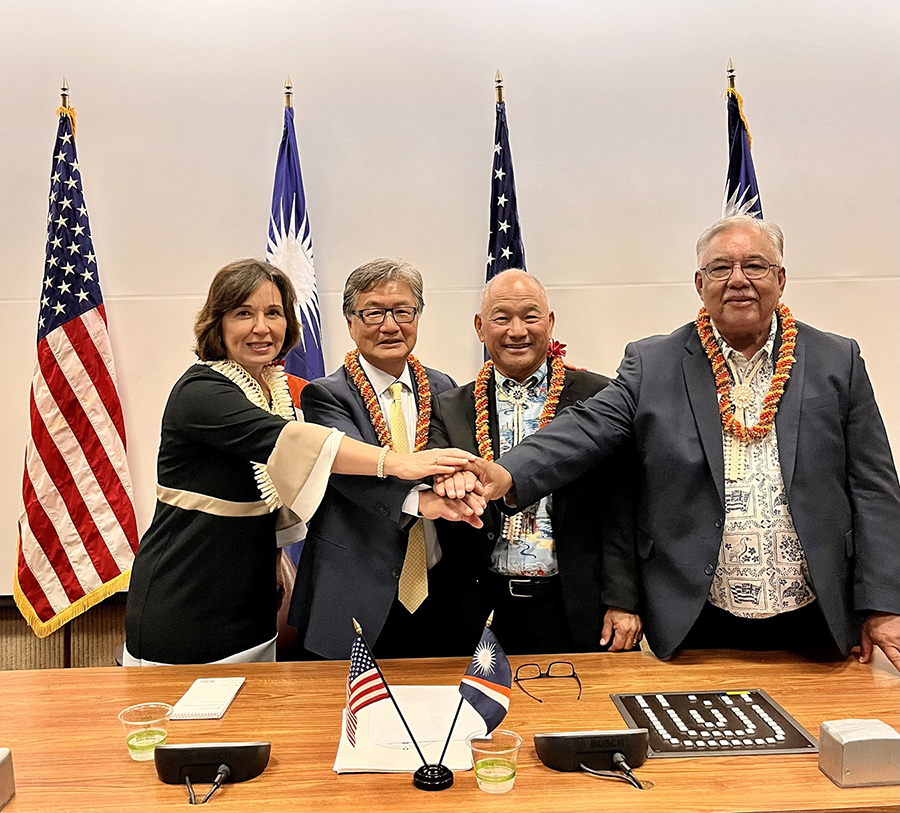U.S. Formalizes Agreements With the Marshall Islands
November 2023
By Chris Rostampour
The United States and the Republic of the Marshall Islands, after months of haggling, finalized a new 20-year agreement that would provide the strategic Pacific Island nation with $2.3 billion in economic provisions.
 Joseph Yun, the U.S. special envoy for compact negotiations, and John Ading, the Marshall Islands minister of foreign affairs and trade, signed three agreements related to the Compact of Free Association on Oct. 16 in Honolulu after reaching what both sides have called a “compromise.”
Joseph Yun, the U.S. special envoy for compact negotiations, and John Ading, the Marshall Islands minister of foreign affairs and trade, signed three agreements related to the Compact of Free Association on Oct. 16 in Honolulu after reaching what both sides have called a “compromise.”
The package must be approved by the U.S. Congress and the Marshall Islands Parliament.
The extension of the compact with the Marshall Islands, and earlier compacts with the Federated States of Micronesia and the Republic of Palau, will guarantee the United States exclusive military rights over large areas in the Pacific region at a time of increasing tension and competition with China. It also guarantees a continuation of federal services and rights for citizens of the island nations. (See ACT, March 2023.)
Negotiations with the Marshall Islands had stalled over a dispute on how the United States would address environmental and health damages to the Marshallese caused by 67 nuclear atmospheric tests conducted by the United States between 1946 and 1958. (See ACT, November 2022.)
The three nations were formerly U.S. territories that came under the direct administration of the United States during World War II. Combined, they cover a maritime area larger than the continental United States, including some 1,000 islands and atolls, and have a population of roughly 200,000 people.
The newly signed agreements include an amendment to the Marshall Islands compact, a new fiscal procedures agreement, and a new trust fund agreement, according to a statement from the U.S. State Department.
The statement offered no specifics, but draft legislation submitted to Congress shows that the package includes $700 million to underwrite a new Marshall Islands trust fund. Whether this amount is included in the $2.3 billion total economic package or separate is not clear in the draft bill, but Marshallese officials and media have reported it as an “additional” amount.
Phillip Muller, the Marshall Islands chief negotiator, said the nation aims to “repurpose” this fund to be used for its citizens “who have suffered because of U.S. nuclear or other military activities,” according to The Marshall Islands Journal.
Speaking at the signing ceremony, Ading described the negotiations as “long and difficult” and said “there have been times when communications had almost broken down entirely,” according to Pacific Island Times.
Ading said that he and his colleagues were “not able to work toward resolving our nation’s nuclear legacy” but still achieved “substantial increases” in promised U.S. funding, the Honolulu Civil Beat reported.
Congress has resumed consideration of a draft bill submitted in June 2023 to amend and appropriate funding for all three compacts, totaling $7.1 billion over two decades.
At a hearing of the House Natural Resources Committee on Oct. 19, Yun called for urgent approval of the legislation. But Amata Coleman Radewagen, American Samoa’s U.S. House delegate, referring to the Marshall Islands agreement, said “there is much in these agreements that is ambiguous, subject to further interpretation and discretion of the parties.” She urged Congress to “prescribe boundaries on interpretation” in a way that would serve the interests of both sides.
Yun admitted that including language related to nuclear testing in the agreements helped resolve the impasse in the Marshall Islands negotiations. As to how the amended agreements would impact the Marshall Islands nuclear claims tribunal, known as Section 177, Yun said, “We completely believe Section 177 remains in effect.”
The United States asserts that the compact and the tribunal “constitute the full settlement of all claims, past, present, and future, of the government, citizens and nationals of the Marshall Islands related to the nuclear testing program.” But the Marshallese do not consider the tribunal to be fully adjourned and claim roughly $3 billion in “uncompensated damages.”
